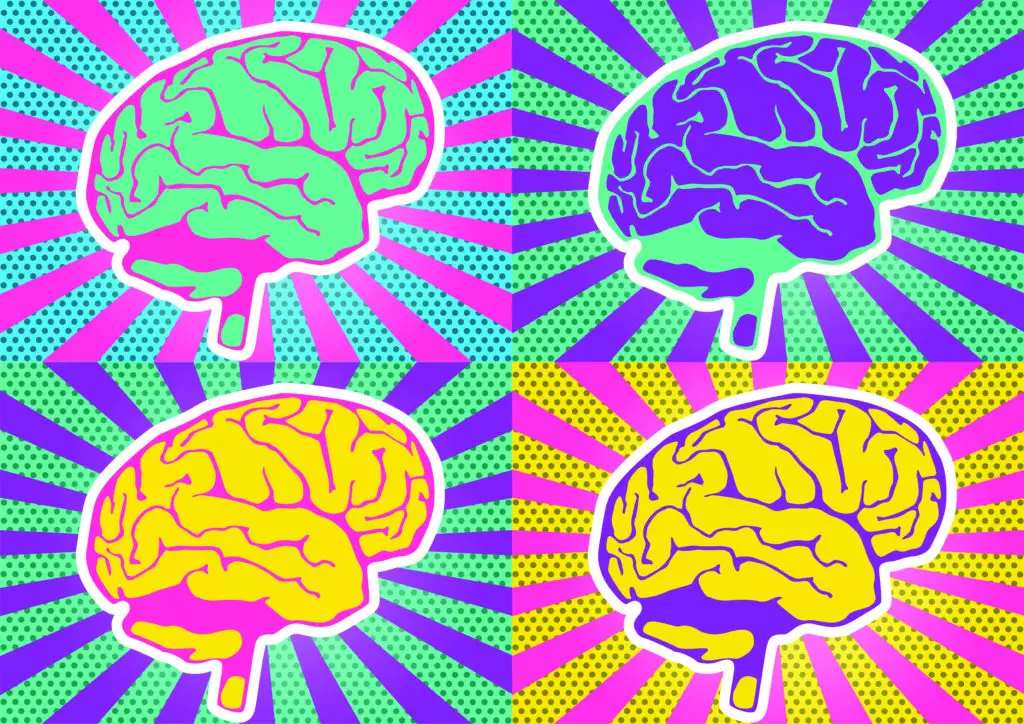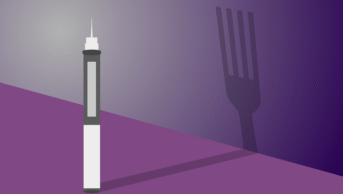
Shutterstock.com
In November 2022, the largest trial to date of the psychedelic drug, psilocybin, showed that — alongside psychological support — a single 25mg dose could improve the symptoms of treatment-resistant depression for up to 12 weeks.
Previous studies have suggested an antidepressant mechanism for psilocybin therapy and have shown that psilocybin is at least as effective as the antidepressant escitalopram in treating major depressive disorder[1,2].
However, the latest phase IIb study, published in the New England Journal of Medicine (NEJM), provides the strongest evidence to date that larger trials of psilocybin are justified[3].
“It’s big,” says Joanna Neill, professor of psychopharmacology at the University of Manchester (Division of Pharmacy and Optometry) and chair of the Drug Science Medical Psychedelics Working Group.
“It’s so much bigger than any of the other trials to date. It’s a phase IIb clinical trial [and] it’s the first one to be completed with this number of patients and in multiple sites.”
However, while many experts welcomed the findings, others were more sceptical, pointing to flaws in the study’s methodology.
With a phase III trial of the drug just around the corner and psilocybin research growing from strength to strength, now is the time to take stock of what we know about this intriguing compound and, more importantly, what we still have yet to learn. Could psilocybin be a potential alternative to antidepressants in the future?
A promising new treatment
As of 29 November 2022, Clinicaltrials.gov had listed 88 active clinical trials involving psilocybin (see Figure). The highest proportion of these are looking at the use of the drug in depression; however, 12 trials are exploring its use in addiction and 10 trials are using it to treat patients with different kinds of pain.
It is part of a rising interest in psychedelic drugs for the treatment of depression; other drugs, including ketamine, MDMA and LSD, have also shown promise in this clinical area[4].
One of the most promising treatment areas for psilocybin is ‘treatment-resistant depression’, a term used to define patients for whom at least two courses of antidepressant treatment have failed[3]. People with treatment-resistant depression make up around a third of all people with depression and have greater severity and duration of illness, disability, hospitalisation, risk of suicide and economic costs than people with depression who respond to treatment[3,4].
The researchers behind the latest study, which was funded by COMPASS Pathways, a mental health care company, and led by Guy Goodwin, its chief medical officer, aimed to identify an acceptable efficacious dose and assess the safety of synthetic psilocybin, administered with psychological support, in patients with a treatment resistant major depressive episode.
For the study, the researchers gathered 233 participants with treatment-resistant depression, who had not responded to between 2 and 4 previous treatments, at 22 sites across 10 countries, including the UK. Each was randomly assigned to receive either 25mg, 10mg or 1mg, the latter of which served as the control, of COMP360 — COMPASS’s pharmaceutical-grade synthetic psilocybin formulation.
Administration of the drug in capsule form took place in rooms designed to provide a non-clinical, calming atmosphere and lasted 6–8 hours, until the psychedelic effects of the drug had fully dissipated.
The trial then followed participants for 12 weeks after treatment, during which time they received two “integration sessions”, at day two and week one, which, according to the researchers, was aimed to support participants in “deriving their own insights and solutions” from their experience with psilocybin.
Participants were requested to remain off antidepressant treatment during the first three weeks but were allowed to restart them at any time during the trial if deemed clinically necessary.
The primary endpoint was the change in the patients’ total score from baseline to week three on the Montgomery-Åsberg Depression Rating Scale (MADRS), a scale ranging from 0–60, with higher scores indicating more severe depression.
After three weeks, the researchers found that the highest dose (25mg), but not the intermediate dose (10mg), resulted in significantly lower levels of depressive symptoms after three weeks than the lowest dose (1mg). The incidence of response at week three was 37% in the 25mg group, 19% in the 10mg group, and 18% in the 1mg group.
It’s clear that it’s not going to work for everybody … but 37% response rate at four weeks is not bad
Joanna Neill, professor of psychopharmacology at the University of Manchester (Division of Pharmacy and Optometry) and chair of the Drug Science Medical Psychedelics Working Group
However, an accompanying editorial, written by Bertha Madras, professor of psychobiology at the Harvard Medical School Department of Psychiatry, said that the 37% incidence of response with the 25mg dose was “numerically lower” than that in large trials of conventional antidepressants for major depression[5].
Neill says that this may be true for the first course of treatment, but for some patients in the trial psilocybin was their third, fourth or even fifth shot at an antidepressant.
The ‘Sequenced Treatment Alternatives to Relieve Depression’ (STAR*D) trial, the results of which were published in 2006, showed that incidences of remission became progressively lower from the first course of antidepressant treatment (37%) to the second course (31%), third course (14%) and fourth course (13%)[6].
“That’s really the comparison that should have been made in the editorial, not the response in major depressive disorder to first or second antidepressants.
“The comparison [should be] 37% [with psilocybin] versus about 13% [with antidepressant treatment].
“It’s clear that it’s not going to work for everybody… [but] 37% response rate at four weeks is pretty good overall.”
Expectation effect
Another detail picked up by experts was that adverse events were found to be higher in the 25mg group (84%) compared with the control group (72%), and three patients in the 10mg and four patients in the 25mg groups reported suicidal ideation or self-injurious behaviour.
Ravi Das, an associate professor at University College London, said: “There is some evidence for greater incidence of adverse events, including a troubling three instances of suicidal behaviour in the 25mg group. These effects will be important to monitor in future studies.”[7]
However, Allan Young, interim vice dean for Academic Psychiatry at the Institute of Psychiatry, Psychology and Neuroscience (IoPPN) at King’s College London (KCL), and one of the investigators of the trial, says that the side effects were “not particularly worrisome”.
“They included headache, nausea, dizziness, fatigue and that occurred in all groups but was slightly higher in the 25mg group,” he said.
“Suicidal ideation was seen in all the dose groups because … that’s part of depression.”
Young also said that the cases of suicidal ideation or suicidal behaviour occurred a period of time after the treatment had finished.
“It was probably either chance that this was worse in one group, or it could be an expectation effect where people who had thought they were going to get a very good new treatment didn’t benefit from it.”
It’s not that the drug is causing a suicidal behaviour, it’s that it has not had the effect that you want to raise your mood and on top of depression that is very, very disappointing; it leads you to feel desperate and hopeless
James Rucker, co-lead of the psychoactive trials group at King College London’s Institute of Psychiatry, Psychology and Neuroscience and consultant psychiatrist at South London and Maudsley NHS Foundation Trust
Expectation effect, or expectancy bias, is an important part of psychedelic trials, particularly those involving people with depression; because the level of optimism around the treatment working is so high.
“It’s basically a disappointment effect,” explains James Rucker, co-lead of the psychoactive trials group at KCL’s IoPPN and consultant psychiatrist at South London and Maudsley NHS Foundation Trust.
“It’s not that the drug is causing a suicidal behaviour, it’s that it has not had the effect that you want to raise your mood and on top of depression that is very, very disappointing; it leads you to feel desperate and hopeless.”
This editorial draws attention to several other limitations of the study, including the lack of placebo control or comparisons with approved antidepressants, short-term duration of monitoring and awareness of trial-group assignments by participants because of the hallucinogenic effects of the drug(5).
Some of these were also highlighted by other independent experts called on to comment on the study(7). For example, Andrew McIntosh, head of division of psychiatry at University of Edinburgh said: “Participants were not asked if they could guess whether they were in the arm of the study that received a higher dose of the psychedelic.
“This is important, because psilocybin is associated with euphoria and changes in perception that may reveal that they are in a higher-dose or ‘more active’ treatment arm.”
Impossible to blind
However, ‘limitations’ like these can be difficult, if not impossible, to do anything about.
“There are subjective psychedelic effects that give the game away,” explains Young.
“And the compromise to that was to have the three doses — the 1mg, 10mg and 25mg.
“Of course, remember, even though they weren’t ‘blind’ per se, to the fact that they were getting active treatment, they were blind to the dose.”
As James Rucker points out, this problem isn’t exclusive to psychedelics — many commonly used treatments are impossible to blind against in clinical trials.
“It’s blatantly obvious to anyone in a clinical trial of olanzapine, whether or not they got olanzapine — it’s potently sedative.”
“There are loads of examples of things in medicine where we do not question their efficacy even though it’s inherently impossible to blind — surgeries, psychotherapy, physiotherapy — they’re routinely accepted into medical practice and the evidence is accepted, but they’re impossible to blind and I think the same applies to psychoactive drugs.
When you comment that blinding is a problem in these trials, you’re missing the point because … what we’re trying to interrogate with this trial design is the synergy between psychotherapy and the drug
James Rucker, co-lead of the psychoactive trials group at King College London’s Institute of Psychiatry, Psychology and Neuroscience and consultant psychiatrist at South London and Maudsley NHS Foundation Trust
“The problem is that they’re ‘drugs’, so people bring this model of therefore they must be blinded, they must be separated from their contexts.
“When you comment that blinding is a problem in these trials, you’re missing the point because…what we’re trying to interrogate with this trial design is the synergy between psychotherapy … and the drug.”
However, the main challenge of psilocybin research — and one that is a long way off being resolved — is its schedule one classification which means that scientists need a Home Office licence in order to be able to conduct research with psychedelics.
Neill says it cost her over £3,000 for her to get her licence and this was for animal studies in a university. It costs a great deal more to run a clinical study because a licence is required for each location where the drug is kept.
“I’m lucky I’m in a school of pharmacy; you have to change your systems, you need a locked and alarmed cabinet, you have to have somebody trained to dispose of the drug, so there’s an awful lot of added expense and bureaucracy that nobody’s really talking about.”
Henry Fisher, chief scientific officer at Clerkenwell Health, Europe’s first commercial facility for psychedelic drug trials, based in London, says: “It’s not impossible to get a license but it’s a long process and it’s not easy.
“A lot of sites, if they’re not primarily focused on this area, wouldn’t necessarily pursue it … so it means that when companies want to run a multi-site trial, they just don’t have places to do it.”
Clerkenwell Health, set up in 2020, has three main functions. First, their core clinical research organisation function which involves liaising with regulators, designing clinical trials and managing the trials once they are underway. Second, they have a site set up in London for delivering the trials themselves. And, finally, as many of the trials they are involved with are based on psychedelic-assisted psychotherapy, they are training up a ‘bank’ of therapists and associated technologies to support their clients’ trials.
“We are on track and engaged to start running trials from the beginning of the New Year,” says Fisher.
It is hoped that these trials — as well as others being conducted, including the phase III COMPASS trial owing to start soon — will answer many of the questions around psilocybin that are still yet to be answered.
Unanswered questions
“It’s pretty clear how the drug works at a pharmacological level,” explains Fisher. “That’s well understood, and there are some leading prevailing theories on what that then leads to — [such as] the increase in neuroplasticity … but there’s a few competing ideas.
“Once we understand that better, that will also translate into understanding how we can support patients better with therapy.”
Emilio Arbe, chief medical officer at Clerkenwell Health, says there are also unanswered questions around the right dose regimen and what kind of therapy is the most appropriate.
“The therapy [in the NEJM study] was deliberately just supportive. It wasn’t [cognitive behavioural therapy], it wasn’t psychodynamic, it was just there for safety to reassure the patient if they were distressed.
You will hear people have gone to Peru and come back really enamoured with the place and the people there, but that’s not what helps you do your day job in Milton Keynes
Emilio Arbe, chief medical officer at Clerkenwell Health
“Depending on how chronically ill somebody has been, they might need several doses [of psilocybin] and several sessions — most types of therapies last a minimum of 12 weeks — [to get] a long lasting benefit.”
Contrary to popular belief, this is not about individuals going into the Peruvian rainforest to take psychedelics and have a life-changing experience.
“We’re developing this treatment for mainstream psychiatry,” says Arbe.
“You will hear people have gone to Peru and come back really enamoured with the place and the people there, but that’s not what helps you do your day job in Milton Keynes.”
He says that part of this might be to find a way to treat patients, who are already taking antidepressants, without having to stop them.
“As you know, if you’re really depressed, and on top of that you have to suffer withdrawal symptoms … it’s a big ask. If we want to see these implemented widely in the NHS, we need to work out to overcome that barrier,” he adds.
Fortunately, there’s no end of interest from the public to be involved in trials looking at psilocybin; in fact trials are often oversubscribed.
However, should it become a licensed medicine, the stigma linked to psychedelics among those who would be prescribing it would need to be addressed if patients are to benefit.
“There will need to be education for the doctors that are expected to be prescribing it so they know what they’re doing, and how it’s meant to help. It is dramatically different to any of the other tools in their toolbox,” says Fisher.
Plus, as a medicine that goes hand in hand with therapy, the current dearth in therapists will also need to be remedied.
“There’s a real potential that once psilocybin reaches the market, there’ll be a lack of skilled therapists or therapists trained in this area to actually deliver effectively, there’ll either be a shortage, or there’ll be therapists trying to deliver this that aren’t sufficiently trained,” Fisher adds.
Other indications
It is not just depression in which psilocybin is showing promise. It is hoped that the compound could be used to treat other conditions for which there are currently limited treatments, such as anorexia nervosa.
Any conditions that have, as part of their pathology, ruminative thoughts and rigidity in thinking — they tend to be conditions where there’s potential
Henry Fisher, chief scientific officer at Clerkenwell Health
“Addiction, obsessive compulsive disorder, eating disorders, anxiety — any conditions that have, as part of their pathology, ruminative thoughts and rigidity in thinking — they tend to be conditions where there’s potential,” explains Fisher.
The first trial to be approved by Clerkenwell Health is looking at the use of the drug in help patients with terminal cancer, adjusting to and accepting their diagnosis.
Young also hopes that what is learned about psilocybin can be applied to other psychedelics — such as LSD — as many work along the same pathways.
“They all have a reasonably clear-cut mechanism of action, principally through 5-HT2A agonism, but also through effects of 5-HT1A receptors. It would be nice to see replication with another psychedelic.”
While there appear to be as many unanswered questions around psilocybin as there are answers, one thing that is certain is that the recent trial results do show a significant signal of benefit in the treatment of treatment-resistant depression.
Although the phase III trial will tell us more in terms of its efficacy and safety it is clear that psilocybin is one to watch and that it could one day provide a new, much needed, option for patients with depression and other mental health conditions.
“This is a paradigm shift,” says Neill. “You’d rather have this than be on an antidepressant for ten years.”
As Rucker says: “Antidepressants are good drugs, but there are some people who are having an awful time in their life and antidepressants just take away the awful feeling.
“The best long-term solution is to sort out whatever’s going on in your life; psilocybin can make that very apparent … sometimes for the first time.
“And that can be terribly difficult if you haven’t got the right sort of support. But, if you have got the right support in a medically controlled environment with a psychotherapist, it can be really useful.”
Box: Second time lucky — the history of psilocybin
Psilocybin is a tryptamine alkaloid found in several species of psilocybe, more commonly known as ‘magic mushrooms’. It was first isolated and identified in 1958 and synthesised a year later by Swiss chemist Albert Hofmann[8].
The discovery was met with huge enthusiasm by the research community; during the 1960s psilocybin was widely used in the experimental research of mental disorders and even in psychotherapy[8]. However, it was not long before knowledge of the properties of these mushrooms spread among the general public and it became popular as a recreational drug.
Consequently, in 1970, the decision was taken to class psilocybin as a schedule I drug — defining it as having no therapeutic value — and all human experiments gradually ground to a halt.
However, since the late 1990s, psilocybin research has seen somewhat of a revival. It is now one of the most used psychedelics in human studies and its use is showing promise across a variety of conditions.
- 1Daws RE, Timmermann C, Giribaldi B, et al. Increased global integration in the brain after psilocybin therapy for depression. Nat Med. 2022;28:844–51. doi:10.1038/s41591-022-01744-z
- 2Carhart-Harris R, Giribaldi B, Watts R, et al. Trial of Psilocybin versus Escitalopram for Depression. N Engl J Med. 2021;384:1402–11. doi:10.1056/nejmoa2032994
- 3Goodwin GM, Aaronson ST, Alvarez O, et al. Single-Dose Psilocybin for a Treatment-Resistant Episode of Major Depression. N Engl J Med. 2022;387:1637–48. doi:10.1056/nejmoa2206443
- 4Willyard C. Psychedelic drugs take on depression. Nature. 2022;608:S36–8. doi:10.1038/d41586-022-02205-w
- 5Madras BK. Psilocybin in Treatment-Resistant Depression. N Engl J Med. 2022;387:1708–9. doi:10.1056/nejme2210975
- 6Rush AJ MD, Trivedi MH MD, Wisniewski SR PhD, et al. Acute and Longer-Term Outcomes in Depressed Outpatients Requiring One or Several Treatment Steps: A STAR*D Report. AJP. 2006;163:1905–17. doi:10.1176/ajp.2006.163.11.1905
- 7expert reaction to Phase IIb Clinical Trial of Single-Dose Psilocybin for a Treatment-Resistant Episode of Major Depression. Science Media Centre. 2022.https://www.sciencemediacentre.org/expert-reaction-to-phase-iib-clinical-trial-of-single-dose-psilocybin-for-a-treatment-resistant-episode-of-major-depression/ (accessed 7 Dec 2022).
- 8Tylš F, Páleníček T, Horáček J. Psilocybin – Summary of knowledge and new perspectives. European Neuropsychopharmacology. 2014;24:342–56. doi:10.1016/j.euroneuro.2013.12.006


